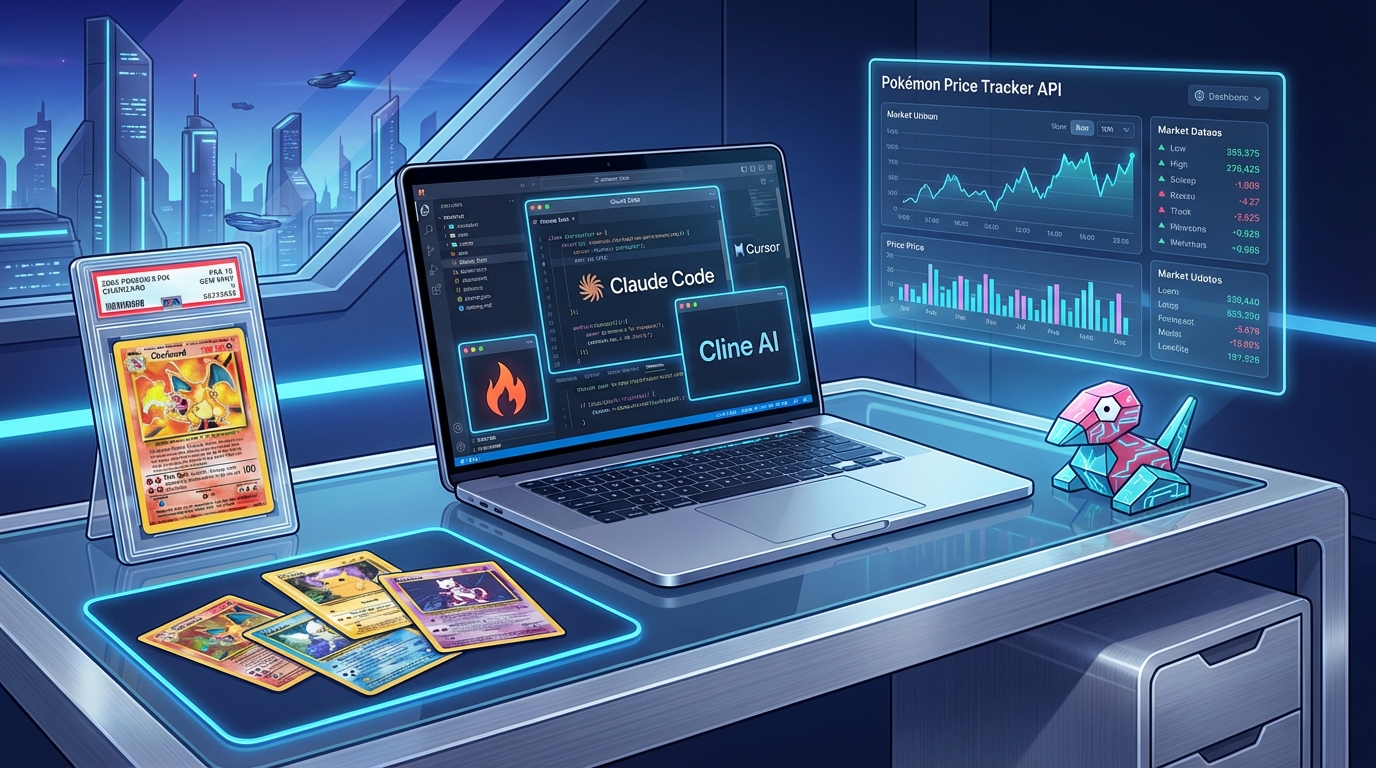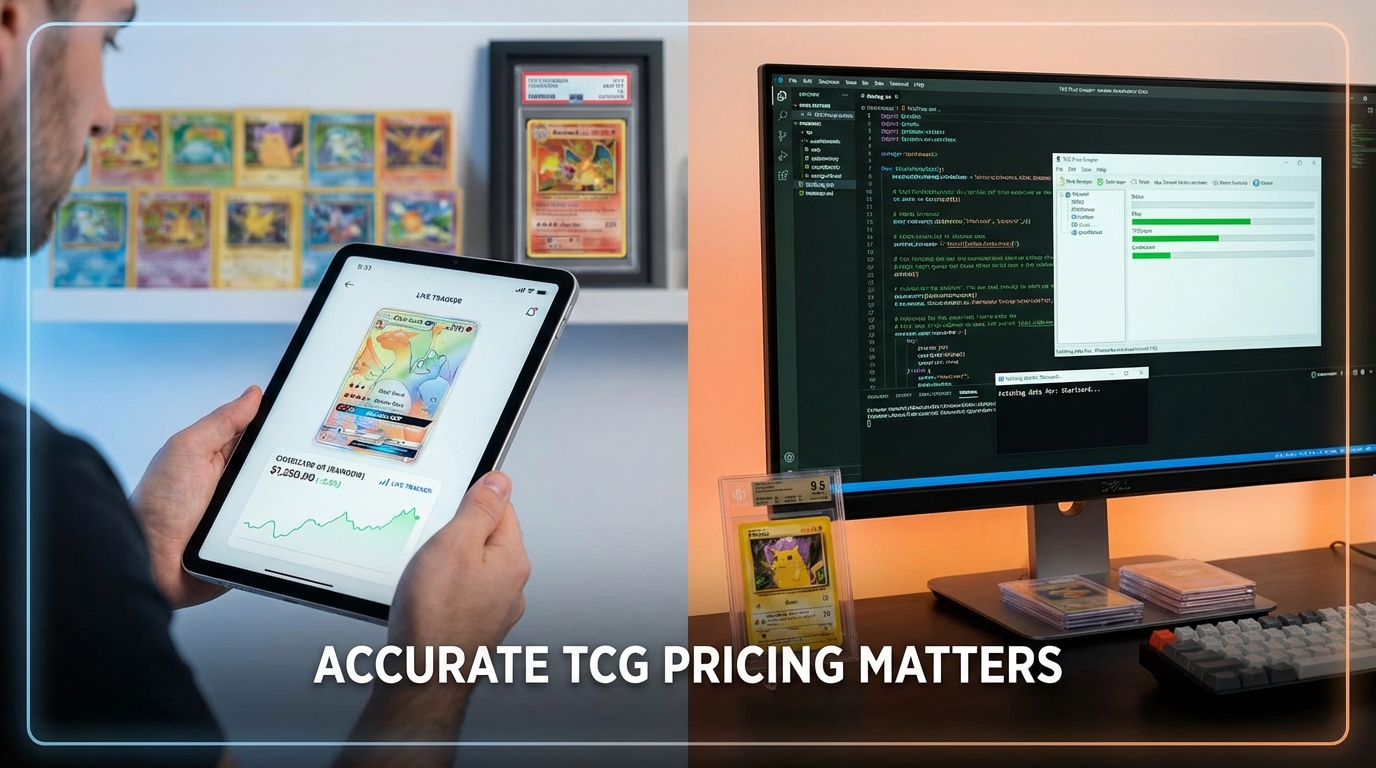Pokemon Card Price API: Complete Developer Guide to Real-Time TCG Data 2025

API Development Team
Pokemon Card Price API: Complete Developer Guide to Real-Time TCG Data 2025
Building Pokemon TCG applications requires reliable, up-to-date pricing data. Our Pokemon Card Price API provides developers with comprehensive access to real-time market values, historical trends, and detailed card information—powering everything from mobile apps to investment platforms.
This complete guide covers API integration, best practices, and advanced implementation strategies for developers working with Pokemon card data.
Why Use a Pokemon Card Price API?
Real-Time Market Integration
Live Data Benefits:
- Instant price updates from multiple marketplaces
- Historical trend analysis for investment applications
- Market volatility tracking for risk assessment
- Cross-platform comparison for arbitrage opportunities
- Automated portfolio valuation for collection management
Development Advantages
Time-to-Market Benefits:
- No web scraping required - clean, structured data
- Reliable uptime with professional infrastructure
- Consistent data format across all endpoints
- Built-in error handling and fallback mechanisms
- Comprehensive documentation with code examples
API Overview and Capabilities
Core Endpoints
1. Card Pricing Endpoint
GET /api/v1/cards/{cardId}/price
Returns current market price, recent sales data, and price trends
2. Historical Data Endpoint
GET /api/v1/cards/{cardId}/history
Provides price history, volume data, and trend analysis
3. Bulk Pricing Endpoint
POST /api/v1/cards/bulk-price
Efficient pricing for multiple cards in a single request
4. Set Information Endpoint
GET /api/v1/sets/{setId}
Complete set data including cards, rarity, and market overview
5. Search Endpoint
GET /api/v1/search
Advanced search with filters for set, rarity, condition, and price range
Authentication and API Keys
Getting Started:
- Create account at Pokemon Price Tracker
- Navigate to API section in dashboard
- Generate API key with appropriate permissions
- Configure rate limits and usage alerts
Authentication Header:
Authorization: Bearer YOUR_API_KEY
X-API-Version: v1
Content-Type: application/json
Detailed Endpoint Documentation
Card Pricing Endpoint
Request Format:
GET /api/v1/cards/sv3pt5-25/price
Response Structure:
{
"card": {
"id": "sv3pt5-25",
"name": "Charizard ex",
"set": "Pokemon 151",
"number": "25",
"rarity": "Double Rare"
},
"pricing": {
"current_price": 89.99,
"currency": "USD",
"last_updated": "2025-07-15T15:30:00Z",
"7_day_change": 5.2,
"30_day_change": -2.1,
"condition": "Near Mint"
},
"market_data": {
"volume_24h": 47,
"avg_sale_price": 87.45,
"price_range": {
"low": 82.00,
"high": 95.00
},
"liquidity_score": 8.5
},
"sources": [
{
"platform": "eBay",
"price": 89.99,
"volume": 23,
"last_sale": "2025-07-15T14:22:00Z"
},
{
"platform": "TCGPlayer",
"price": 87.50,
"volume": 18,
"last_sale": "2025-07-15T13:45:00Z"
}
]
}
Historical Data Endpoint
Advanced Query Parameters:
GET /api/v1/cards/base1-4/history?period=6m&interval=daily&condition=nm
Parameters:
period: 7d, 30d, 3m, 6m, 1y, 2y, 5yinterval: hourly, daily, weekly, monthlycondition: mint, nm, lp, mp, hpsource: ebay, tcgplayer, pwcc, heritage
Response Example:
{
"card_id": "base1-4",
"period": "6m",
"data_points": [
{
"date": "2025-01-15",
"price": 1250.00,
"volume": 12,
"market_cap": 15000000
},
{
"date": "2025-01-16",
"price": 1275.00,
"volume": 8,
"market_cap": 15300000
}
],
"statistics": {
"min_price": 1180.00,
"max_price": 1420.00,
"avg_price": 1298.45,
"volatility": 0.158,
"total_volume": 2847
}
}
Bulk Pricing Endpoint
Efficient Multi-Card Requests:
POST /api/v1/cards/bulk-price
Content-Type: application/json
{
"cards": [
{
"id": "sv3pt5-25",
"condition": "nm"
},
{
"id": "swsh7-144",
"condition": "mint"
},
{
"id": "base1-4",
"condition": "lp"
}
],
"include_history": false,
"include_market_data": true
}
Rate Limit Optimization:
- Single request for up to 100 cards
- Reduces API calls by 99%
- Faster response times
- Lower bandwidth usage
Implementation Examples
JavaScript/Node.js Integration
Basic Price Fetching:
const axios = require('axios');
class PokemonPriceAPI {
constructor(apiKey) {
this.apiKey = apiKey;
this.baseURL = 'https://api.pokemonpricetracker.com/v1';
this.headers = {
'Authorization': `Bearer ${apiKey}`,
'Content-Type': 'application/json'
};
}
async getCardPrice(cardId, condition = 'nm') {
try {
const response = await axios.get(
`${this.baseURL}/cards/${cardId}/price`,
{
headers: this.headers,
params: { condition }
}
);
return response.data;
} catch (error) {
console.error('API Error:', error.response.data);
throw error;
}
}
async getBulkPrices(cardList) {
try {
const response = await axios.post(
`${this.baseURL}/cards/bulk-price`,
{ cards: cardList },
{ headers: this.headers }
);
return response.data;
} catch (error) {
console.error('Bulk API Error:', error.response.data);
throw error;
}
}
}
// Usage Example
const api = new PokemonPriceAPI('your-api-key-here');
api.getCardPrice('sv3pt5-25')
.then(data => {
console.log(`${data.card.name}: $${data.pricing.current_price}`);
})
.catch(err => console.error(err));
Python Integration
Flask Application Example:
import requests
import json
from flask import Flask, jsonify
class PokemonPriceAPI:
def __init__(self, api_key):
self.api_key = api_key
self.base_url = "https://api.pokemonpricetracker.com/v1"
self.headers = {
"Authorization": f"Bearer {api_key}",
"Content-Type": "application/json"
}
def get_card_price(self, card_id, condition="nm"):
url = f"{self.base_url}/cards/{card_id}/price"
params = {"condition": condition}
response = requests.get(url, headers=self.headers, params=params)
response.raise_for_status()
return response.json()
def get_price_history(self, card_id, period="30d"):
url = f"{self.base_url}/cards/{card_id}/history"
params = {"period": period, "interval": "daily"}
response = requests.get(url, headers=self.headers, params=params)
response.raise_for_status()
return response.json()
app = Flask(__name__)
price_api = PokemonPriceAPI("your-api-key")
@app.route('/card//price')
def card_price(card_id):
try:
data = price_api.get_card_price(card_id)
return jsonify(data)
except requests.exceptions.RequestException as e:
return jsonify({"error": str(e)}), 500
@app.route('/card//chart')
def price_chart(card_id):
try:
history = price_api.get_price_history(card_id, "6m")
return jsonify(history)
except requests.exceptions.RequestException as e:
return jsonify({"error": str(e)}), 500
React/Frontend Integration
Real-Time Price Component:
import React, { useState, useEffect } from 'react';
import axios from 'axios';
const CardPriceTracker = ({ cardId }) => {
const [priceData, setPriceData] = useState(null);
const [loading, setLoading] = useState(true);
const [error, setError] = useState(null);
useEffect(() => {
const fetchPrice = async () => {
try {
const response = await axios.get(`/api/cards/${cardId}/price`, {
headers: {
'Authorization': `Bearer ${process.env.REACT_APP_API_KEY}`
}
});
setPriceData(response.data);
setLoading(false);
} catch (err) {
setError(err.message);
setLoading(false);
}
};
fetchPrice();
// Set up real-time updates every 5 minutes
const interval = setInterval(fetchPrice, 300000);
return () => clearInterval(interval);
}, [cardId]);
if (loading) return Loading price data...;
if (error) return Error: {error};
return (
### {priceData.card.name}
${priceData.pricing.current_price}
7d: {priceData.pricing['7_day_change'] > 0 ? '+' : ''}
{priceData.pricing['7_day_change']}%
Volume: {priceData.market_data.volume_24h}
Liquidity: {priceData.market_data.liquidity_score}/10
);
};
export default CardPriceTracker;
Rate Limits and Optimization
Rate Limit Structure
Free Tier:
- 1,000 requests per month
- 100 requests per day
- 10 requests per minute
- Bulk endpoint: 50 cards per request
Professional Tier:
- 50,000 requests per month
- 5,000 requests per day
- 100 requests per minute
- Bulk endpoint: 100 cards per request
Enterprise Tier:
- Unlimited requests
- Custom rate limits
- Dedicated infrastructure
- Priority support
Optimization Strategies
1. Efficient Batching:
// Instead of multiple single requests
const prices = await Promise.all([
api.getCardPrice('card1'),
api.getCardPrice('card2'),
api.getCardPrice('card3')
]);
// Use bulk endpoint
const prices = await api.getBulkPrices([
{ id: 'card1', condition: 'nm' },
{ id: 'card2', condition: 'nm' },
{ id: 'card3', condition: 'nm' }
]);
2. Intelligent Caching:
class CachedPokemonAPI {
constructor(apiKey, cacheTimeout = 300000) { // 5 minutes
this.api = new PokemonPriceAPI(apiKey);
this.cache = new Map();
this.cacheTimeout = cacheTimeout;
}
async getCardPrice(cardId) {
const cacheKey = `price_${cardId}`;
const cached = this.cache.get(cacheKey);
if (cached && Date.now() - cached.timestamp ({
id: item.cardId,
condition: item.condition,
quantity: item.quantity
}));
const prices = await this.api.getBulkPrices(cardIds);
let totalValue = 0;
const detailedBreakdown = [];
prices.cards.forEach((card, index) => {
const quantity = portfolio[index].quantity;
const cardValue = card.pricing.current_price * quantity;
totalValue += cardValue;
detailedBreakdown.push({
name: card.card.name,
quantity,
unitPrice: card.pricing.current_price,
totalValue: cardValue,
dayChange: card.pricing['7_day_change']
});
});
return {
totalValue,
breakdown: detailedBreakdown,
lastUpdated: new Date().toISOString()
};
}
}
Market Analysis Tools
Trend Detection Algorithm:
def analyze_market_trends(api, card_list, period="30d"):
trends = {}
for card_id in card_list:
history = api.get_price_history(card_id, period)
prices = [point['price'] for point in history['data_points']]
# Calculate trend metrics
initial_price = prices[0]
final_price = prices[-1]
price_change = ((final_price - initial_price) / initial_price) * 100
# Calculate volatility
mean_price = sum(prices) / len(prices)
variance = sum((p - mean_price) ** 2 for p in prices) / len(prices)
volatility = (variance ** 0.5) / mean_price * 100
trends[card_id] = {
'price_change': price_change,
'volatility': volatility,
'trend': 'bullish' if price_change > 5 else 'bearish' if price_change 6) {
opportunities.push({
cardId: card.id,
name: card.name,
currentPrice,
avgPrice,
discount: ((avgPrice - currentPrice) / avgPrice) * 100,
liquidityScore: priceData.market_data.liquidity_score
});
}
}
return opportunities.sort((a, b) => b.discount - a.discount);
}
}
Error Handling and Monitoring
Comprehensive Error Management
Error Response Format:
{
"error": {
"code": "CARD_NOT_FOUND",
"message": "Card with ID 'invalid-id' not found",
"details": {
"card_id": "invalid-id",
"suggestion": "Check card ID format (set-number)"
},
"timestamp": "2025-07-15T15:30:00Z",
"request_id": "req_1234567890"
}
}
Common Error Codes:
RATE_LIMIT_EXCEEDED: Too many requestsINVALID_API_KEY: Authentication failedCARD_NOT_FOUND: Card ID not in databaseINVALID_PARAMETERS: Malformed requestSERVICE_UNAVAILABLE: Temporary service issues
Monitoring and Analytics
Usage Tracking:
class APIMonitor {
constructor(apiKey) {
this.api = new PokemonPriceAPI(apiKey);
this.metrics = {
requests: 0,
errors: 0,
responseTime: []
};
}
async monitoredRequest(endpoint, params) {
const startTime = Date.now();
this.metrics.requests++;
try {
const result = await this.api[endpoint](params);
const responseTime = Date.now() - startTime;
this.metrics.responseTime.push(responseTime);
return result;
} catch (error) {
this.metrics.errors++;
throw error;
}
}
getMetrics() {
const avgResponseTime = this.metrics.responseTime.reduce((a, b) => a + b, 0) / this.metrics.responseTime.length;
return {
totalRequests: this.metrics.requests,
errorRate: (this.metrics.errors / this.metrics.requests) * 100,
averageResponseTime: avgResponseTime,
successRate: ((this.metrics.requests - this.metrics.errors) / this.metrics.requests) * 100
};
}
}
Security Best Practices
API Key Management
Environment Variables:
# .env file
POKEMON_API_KEY=your_api_key_here
API_BASE_URL=https://api.pokemonpricetracker.com/v1
Secure Key Storage:
// Never expose API keys in frontend code
// Use environment variables or secure configuration
const apiKey = process.env.POKEMON_API_KEY;
// For frontend applications, proxy through your backend
app.get('/api/card-price/:id', authenticateUser, async (req, res) => {
const price = await pokemonAPI.getCardPrice(req.params.id);
res.json(price);
});
Request Validation
Input Sanitization:
import re
def validate_card_id(card_id):
# Expected format: set-number (e.g., "base1-4", "sv3pt5-25")
pattern = r'^[a-zA-Z0-9]+-[0-9]+[a-zA-Z]*$'
return re.match(pattern, card_id) is not None
def sanitize_condition(condition):
valid_conditions = ['mint', 'nm', 'lp', 'mp', 'hp']
return condition.lower() if condition.lower() in valid_conditions else 'nm'
Production Deployment
Scalability Considerations
Connection Pooling:
const axios = require('axios');
const Agent = require('agentkeepalive');
const api = axios.create({
baseURL: 'https://api.pokemonpricetracker.com/v1',
timeout: 30000,
httpAgent: new Agent({
keepAlive: true,
maxSockets: 100,
maxFreeSockets: 10,
timeout: 60000,
freeSocketTimeout: 30000
})
});
Load Balancing:
class LoadBalancedAPI {
constructor(apiKeys) {
this.apiKeys = apiKeys;
this.currentIndex = 0;
}
getNextAPIKey() {
const key = this.apiKeys[this.currentIndex];
this.currentIndex = (this.currentIndex + 1) % this.apiKeys.length;
return key;
}
async request(endpoint, params) {
const apiKey = this.getNextAPIKey();
// Make request with rotating API key
return this.makeRequest(apiKey, endpoint, params);
}
}
Conclusion: Building with Pokemon Card Data
The Pokemon Card Price API enables developers to create sophisticated applications leveraging real-time market data. Success with the API requires:
- Efficient request patterns using bulk endpoints
- Proper error handling for robust applications
- Intelligent caching to optimize performance
- Security best practices for API key management
- Monitoring and analytics for production reliability
Key Benefits:
- Reduced development time with ready-to-use data
- Real-time accuracy for pricing applications
- Scalable infrastructure supporting growth
- Comprehensive documentation for rapid integration
Getting Started: Sign up for API access at Pokemon Price Tracker and begin building your Pokemon TCG application with professional-grade market data.
Start building with our Pokemon Card Price API - comprehensive documentation, code examples, and dedicated developer support included.

API Development Team
Senior API Engineer
The PokemonPriceTracker team of experts brings you accurate market analysis, investment strategies, and collecting guides to help you make informed decisions in the Pokemon card market.
Follow on TwitterRelated Articles

Use Pokemon Price Tracker API with AI Coding Tools (Claude Code, Cursor, Cline)
Learn how to integrate the Pokemon Price Tracker API into your projects using AI coding assistants. Works with Claude Code, Cursor, Cline, GitHub Copilot, and more.

Team

How to Get Real-Time Pokémon Card Prices for Your App
Want to display real-time Pokémon card prices in your application? This technical guide shows you how to use our real-time API to power your project.

Team

Build a Discord Bot for Pokemon Card Prices - Complete 2025 Guide
Learn how to build a fully-featured Discord bot that provides Pokemon card prices, PSA grading analysis, and market data. Includes commands, embeds, deployment guide, and source code.

PokemonPriceTracker Team
Stay Updated
Subscribe to our newsletter for the latest Pokemon card market trends, investment opportunities, and exclusive insights delivered straight to your inbox.